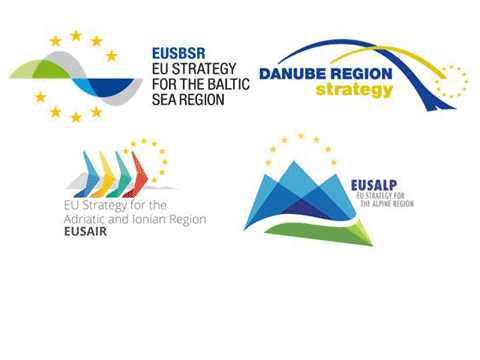On 23 September 2020, the European Commission adopted the third biennial report [COM(2020)578], covering the period from mid-2018 to mid-2020, on the implementation of the four EU macro-regional strategies (MRS): the EU Strategy for the Baltic Sea Region (EUSBSR), the EU Strategy for the Danube Region (EUSDR), the EU Strategy for the Adriatic and Ionian Region (EUSAIR) and the EU Strategy for the Alpine Region (EUSALP). The report is published at a time when the crisis caused by the COVID-19 pan
The Commission adopts the third report on the implementation of EU macro-regional strategies
- 24 September 2020

On 23 September 2020, the European Commission adopted the third biennial report [COM(2020)578], covering the period from mid-2018 to mid-2020, on the implementation of the four EU macro-regional strategies (MRS): the EU Strategy for the Baltic Sea Region (EUSBSR), the EU Strategy for the Danube Region (EUSDR), the EU Strategy for the Adriatic and Ionian Region (EUSAIR) and the EU Strategy for the Alpine Region (EUSALP).
The report is published at a time when the crisis caused by the COVID-19 pandemic is having severe economic, fiscal and social impacts on the European society. Therefore, in addition to assessing the state of implementation of the MRS, the report also considers the role that MRS can play in addressing the crisis through coordinated actions.
In terms of achievements, the report focuses on the three, broad, interconnected priorities that all four MRS have in common: environment and climate change; research & innovation and economic development; and connectivity (transport, energy, digital networks). These three priorities are closely connected with key actions of the European Green Deal as well as the European Digital Agenda and ‘An economy that works for people’.
As examples of concrete achievements in the period covered by the report, the MRS have:
- helped improve water quality through a better management of hazardous substances being released into the Baltic Sea and a better monitoring of the Adriatic-Ionian Seas;
- helped enhance the water status of the Danube river through reinforced cooperation between river basin management planning and flood risk prevention;
- helped develop the conditions for ecological connectivity in the Alpine region by deploying green infrastructure;
- supported knowledge capitalisation and sharing research and innovation in the Alpine and the Danube regions;
- promoted energy efficient inland waterway transport by contributing to the implementation of the ‘Fairway Rehabilitation and Maintenance Master Plan’;
- supported the sustainable development of transport corridors in the Baltic Sea region and the distribution and supply of liquefied natural gas (LNG) for maritime transport in the Adriatic-Ionian region.
Full details on achievements in all priority areas of each MRS are to be found in the staff working document accompanying the report [SWD(2020)186].
The MRS are a powerful tool to support economic, social and territorial development and integration, and to foster good relations with neighbouring countries. They are also a flexible tool to react to new global challenges. The MRS provide a ready and operational cooperation framework to ensure better coordination of actions, investments and projects within their territories. For all these reasons, they can play a significant role in helping MRS countries and regions to tackle the post-COVID-19 crisis by implementing, in a coordinated manner, the European Green Deal and the European Digital Strategy, which are the cornerstone of Europe’s growth strategy. In that respect, the report recommends a close coordination between MRS national and thematic coordinators and all relevant stakeholders across the macro-region in the areas in which the MRS have proved their added value.
As the MRS do not have their own resources, their implementation depends on bundling funding from different sources. Therefore, the success or failure of the MRS is ultimately linked to their capacity to ensure that EU, national, regional, and other public and private funds are aligned with the priorities of the relevant strategy.
In this regard, in the last two years coordination has been ongoing between MRS national and thematic coordinators and national/regional authorities responsible of EU programmes supported by the European Structural and Investment (ESI), IPA III and NDICI funds. The aim is to ‘embed’ MRS priorities into the next generation (2021-2027) of these national/regional programmes. All four MRS have taken initiatives to accelerate and strengthen this ‘embedding’ process. Efforts should be intensified during the preparation of programmes before their transmission to Brussels. This is vital for the MRS to achieve their economic, social and territorial objectives and to contribute to the post-COVID-19 economic recovery.
The report also highlights the role that MRS play with regard to the enlargement process. The cooperation between EU Member States and countries of the Western Balkans in the Adriatic-Ionian and Danube strategies enables convergence to EU policies to substantiate their perspective for EU membership. In this context, the inclusion on April 2020 of the Republic of North Macedonia in the Adriatic-Ionian strategy highlighted the attractiveness that this cooperation framework offers to accession countries. Closer synergies between MRS and the enlargement process is key to supporting the EU perspective for the Western Balkans, in line with the EU priority ‘A stronger Europe in the world’. The current involvement on an equal footing of the Western Balkans in the Adriatic-Ionian and the Danube strategies should be further enhanced, including by ensuring their effective participation in implementing the twin green and digital transition.
Next Steps
The report and its accompanying staff working document are now transmitted to the European Parliament, the Council, the European Economic and Social Committee and the Committee of the Regions for their consideration.
More information
